‘They will be brought to justice’: Vladimir Putin breaks silence on Wagner mutiny
Vladimir Putin vowed the leaders of an attempted rebellion would face consequences for the ‘criminal’ betrayal that was ‘doomed to fail’.
World
Don't miss out on the headlines from World. Followed categories will be added to My News.
Russian President Vladimir Putin said the organisers of the Wagner rebellion “would be brought to justice”, while soldiers dragged into the chaos would be allowed to return to the front line.
Putin made no mention of his nemesis Yevgeny Prigozhin by name during his first public comments directly addressing the “colossal threat”.
Labelling the saga “blackmail” that was “doomed to failure”, Putin said Russia was saved by sections of the military that remained loyal to the Kremlin as Prigozhin marched on Moscow.
“The organisers of this rebellion cannot but understand that they will be brought to justice. Everybody understands that. This is criminal activity which is aimed at weakening the country,” Putin said.
“The organisers of this rebellion have betrayed those people who were dragged into this,” Putin continued, adding: “We know that the overwhelming majority of Wagner are patriots of Russia. They have shown their courage in defending Donbas, and yet were encouraged to fight against their compatriots.”
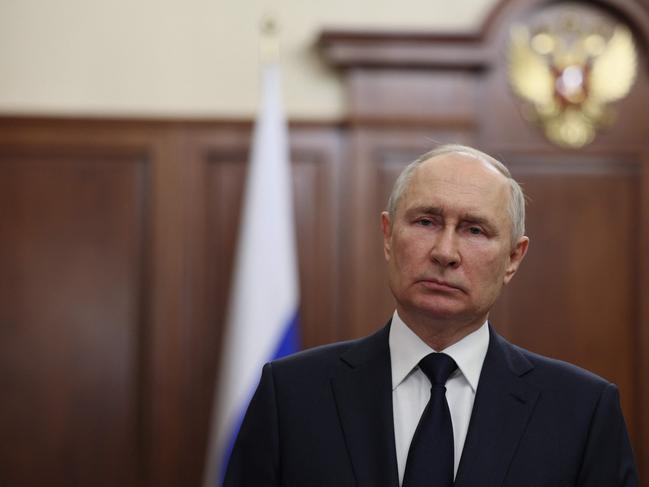
In the short speech, Putin said the “suicide” was exactly what Kyiv and the West wanted, “that Russian soldiers kill each other”.
“That servicemen and civilians should be killed, and in the final analysis that Russia should fail and our society to be fragmented, splintered, and take revenge for their failure at the front,” he said.
“But they slipped up. They made a mistake. Especially with regards to the special services which have maintained their oath to the country.”
While thanking the unnamed people who called off the rebellion, Putin said they would hold responsible those who planned the “colossal threat”, which would have had tragic and devastating consequences for the country”.
PRIGOZHIN APPEARS FOR FIRST TIME SINCE CHAOS
Wagner chief Yevgeny Prigozhin released an 11-minute audio file his first message since halting his mercenary group’s armed mutiny march to Moscow.
The leader of Russia’s Wagner mercenary group said his aborted rebellious march on Moscow over the weekend had shown up “very serious security problems” in Russia, while insisting he did not want to overthrow President Vladimir Putin.
Prigozhin broke his silence in a Telegram audio message two days after staging the dramatic armed rebellion that saw his fighters approaching Moscow in columns.
The private army chief did not reveal his location but is reported to move to Belarus, after a deal brokered by Minsk to end the mutiny.
Prigozhin said his revolt was aimed at saving his embattled mercenary outfit and bringing to justice Russia’s military leadership who made “huge mistakes” during the Ukraine campaign.
“We went to demonstrate our protest and not to overthrow power in the country,” Prigozhin said.
âš¡ï¸Prigozhin about his deal with Lukashenko:
— Anton Gerashchenko (@Gerashchenko_en) June 26, 2023
"Lukashenko extended his hand and offered to find a solution to continue the work of Wagner PMC in legal jurisdiction." pic.twitter.com/up2vyOQSS2
But he said the mutiny -- which saw armed fighters speed through southern Russia en route to Moscow -- exposed major security issues.
Wagner’s convoy stopped 200 kilometres (125 miles) short of Moscow and had “blocked all military infrastructure” including air bases along its path, Prigozhin said.
He claimed the group had support from locals along the way.
“In Russian towns, civilians met us with Russian flags and the symbols of Wagner,” Prigozhin said.
“They were all happy when we passed through.” Prigozhin said Belarusian leader Alexander Lukashenko offered ways in which Wagner could continue to operate and thereby ended the rebellion.
“Lukashenko held out his hand and offered to find solutions for the continuation of the work of the Wagner private military company in a legal jurisdiction,” Prigozhin said.
The Wagner chief said that he had sent two columns into Russia: one to the city of Rostov-on-Don, which occupied the local army headquarters, and the second one to Moscow.
He halted the rebellion after the column approaching Moscow “did reconnaissance of the area and it was obvious that at that moment a lot of blood will be shed.” He claimed that nobody was killed “on the ground” during the march but admitted casualties in the air.
“We regret that we were forced to hit on aviation, but they dropped bombs and hit us with rocket fire,” he said.
He said that several Wagner fighters were injured and claimed that two soldiers who had joined the rebellion “out of their own will” were killed.
Prigozhin said Wagner fighters were aware of the “end aim” of the march and were “not forced” to join.
He has claimed to have got as close as 200 kilometres from Moscow.
‘WE HAD NOTHING TO DO WITH IT’: BIDEN DENIES ROLE IN RUSSIA MUTINY
US President Joe Biden said Nato played no role in the weekend’s armed mutiny in Russia, saying he gave Vladimir Putin “no excuse to blame this on the West”.
“We made clear that we were not involved. We had nothing to do with it. This was part of a struggle within the Russian system,” Biden said
‘We’re going to keep assessing the fallout of this weekend’s events and implications for Russia and Ukraine,” he added. “But it’s still too early to reach a definitive conclusion about where this is going. The ultimate outcome of this remains to be seen.”
Biden added that he also spoke to Volodymir Zelenskyy, saying that the US would continue to support Ukraine regardless of what happened in Russia.
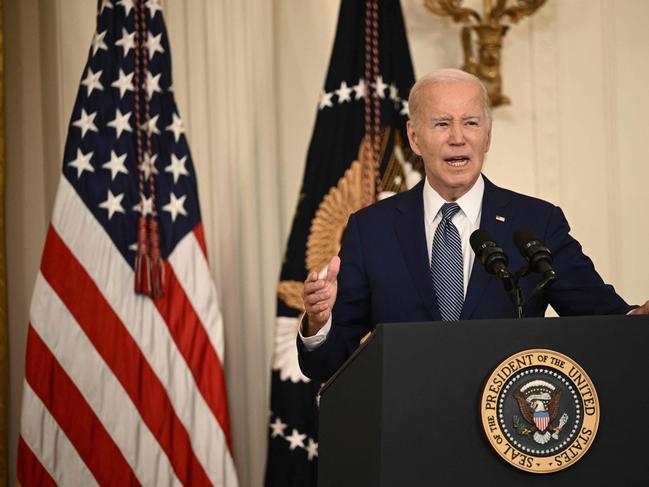
PUTIN APPEARS FOR FIRST TIME SINCE CHAOS
Russian President Vladimir Putin shocked onlookers in his first appearance since the weekend’s chaos by delivering a public address that made no mention of the armed mutiny.
Speaking at a youth forum dubbed the “Engineers of the Future”, Putin praised companies that ensured the “stable operation” of industry in the face of “severe external challenges”.
While Putin’s video address came as the Kremlin attempted to position Russia as back to business as usual, Wagner warlord Yevgeny Prigozhin remained unseen or heard of since the stunning march to Moscow.
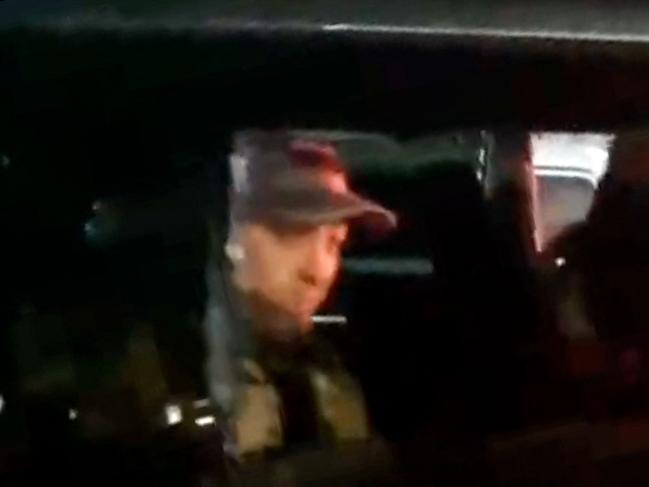
The St Petersburg office of Russia’s Wagner mercenary group also said it was working in “normal mode”.
“Despite events that have taken place, the centre continues to work in normal mode in accordance to the law of the Russian Federation,” the group’s main office said in a statement, thanking its supporters and adding Wagner has “worked for the future of Russia”.
As Russia remained tight-lipped on the fallout from the remarkable series of events, Nato chief Jens Stoltenberg said the short-lived mutiny “demonstrates the fragility” of the Russian regime.
RUSSIA INVESTIGATING CIA ROLE IN MUTINY
Moscow’s spy agency is investigating whether western intelligence services, like the US’s CIA or the UK’s MI6, played a role in the aborted Russian mutiny.
“As [Russian] President [Vladimir Putin] said in his address on Saturday, the entire Western military, economic and information machine has been set in motion against us,” foreign minister Sergei Lavrov said, according to TASS news agency.
It comes as Russian Foreign Minister Sergei Lavrov said the US ambassador to Moscow “gave signals” that the United States was not involved in the Wagner armed mutiny.
The US envoy said the mutiny by Wagner mercs was a Russian internal affair, and that America’s hope was for the safety of Russia’s nuclear arsenal, according to Lavrov.
US INTEL KNEW OF PLANNED UPRISING: REPORT
Intelligence officials conducted briefings at the White House, the Pentagon and on Capitol Hill about the potential for unrest in nuclear-armed Russia a full day before it unfolded, the Washington Post and New York Times reported.
Spy agencies first began tracking indications that Prigozhin and his Wagner mercenary force intended to move against the Russian military leadership in mid-June, the Post said.
The Times said the information was both solid and alarming by mid-week, leading to the flurry of briefings.
In an uprising that played out with dizzying speed, Prigozhin’s forces moved from their camps in Ukraine into Russia Friday and took over a regional military command in the southern city of Rostov-on-Don, before advancing toward Moscow.
As US intelligence officials pinned down information that Prigozhin was preparing military action, they grew concerned about chaos in a country with a powerful nuclear arsenal, the Times reported.
US spy agencies believe that Putin himself was informed that Prigozhin, once a close ally, was plotting his rebellion at least a day before it occurred, the Post reported.
PREPARATIONS MADE FOR ‘SUDDEN COLLAPSE’ OF RUSSIA
The US and their NATO allies are preparing for the collapse of the Russian state after the Wagner armed mutiny among “a range of scenarios”, according to UK Prime Minister Rishi Sunak.
Sunk said he spoke to leaders of the US, France and Germany and agreed that “real cracks” had emerged in the regime of Vladimir Putin.
“It’s a situation that we’ve been monitoring for some time, in the instability that will be caused by Russia’s illegal invasion of Ukraine,” he said.
“It’s too early to predict,” he added. “But of course we are prepared, as we always would be, for a range of scenarios.”
Those scenarios include the sudden collapse of the Russian state, according to British government assessments reported by the Times.
A senior government source told the outlet that the failed uprising left diplomats “hastily preparing for different outcomes”.
“From the very beginning of the invasion, one of the most obvious scenarios was that the war could lead to political unrest back home in Russia,” the diplomat said, adding Britain “must prepare for a whole range of different scenarios” like a collapse of the Kremlin.
“We have to wait, watch and see what comes next. This could be chapter one of something new,” they added.
MUTINY DEMONSTRATES WEAKNESS OF RUSSIAN REGIME: NATO
The aborted mutiny by Russia’s Wagner mercenary group on the weekend showed the weakness of Russia’s leadership, NATO Secretary-General Jens Stoltenberg said on Monday.
“Of course, it is a demonstration of weakness,” he told reporters during a news conference on the Pabrade training grounds in Lithuania.
“It also demonstrates how difficult and dangerous it is for President (Vladimir) Putin to be reliant on mercenaries, that has actually turned against him,” he added.
“It demonstrates the fragility of the Russian regime but it is not for NATO to intervene in those issues, that’s a Russian matter.”
RUSSIA LEFT IN STATE OF CONFUSION
Fearsome Russian intelligence services conducted mass raids on the family homes of senior Wagner mercenary figures at the height of the weekend’s chaotic coup that has left Russia in a state of confusion.
Russian President Vladimir Putin was believed to have left Moscow during or shortly after the Wagner group’s 36-hour insurrection, his whereabouts unknown as his private aircraft flew out of the capital and turned tracking transponders off.
He has now not been seen since Saturday morning when he made the televised address condemning the Wagner “treason”, with State media now running prerecorded interviews of the president talking broadly about his confidence with the “special military operation” (war) in Ukraine.
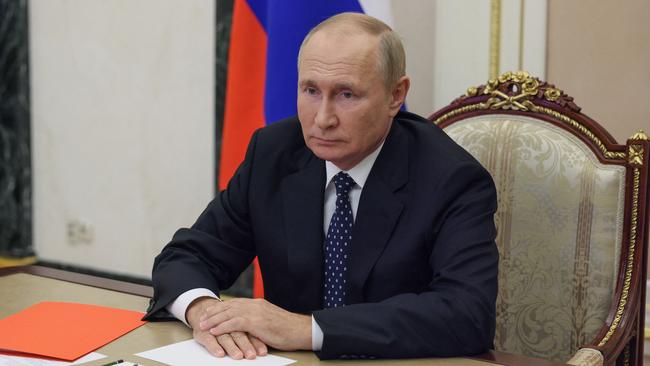
Also vanished his nemesis Wagner warlord Yevgeny Prigozhin who as part of his rebellion backdown over the weekend agreed to be exiled to Belarus but he has yet to appear there.
The fact the 62-year-old was to move there with some of his troops was enough yesterday to prompt both Ukraine and Poland to reinforce their borders.
The lack of clarity over the situation also prompted Lithuania, which will host a NATO summit next month, to call for the bolstering of all Europe’s eastern flank defences.
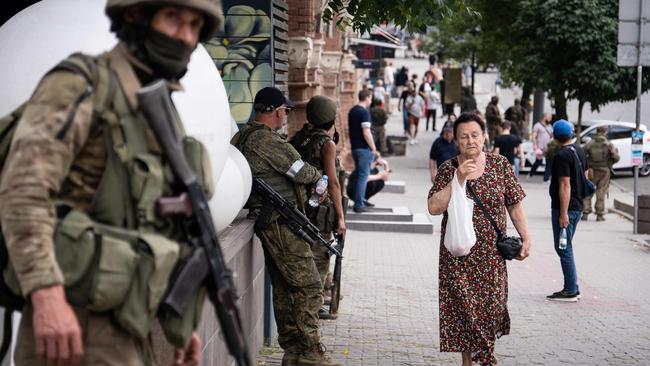
In the UK, Whitehall issued an extraordinary warning based on internal government assessments that the current instability boosted by the absence of key figures meant Britain needed to prepare for the “sudden collapse” of Russia.
In Russia while the declared “emergency”, after Wagner armoured vehicles and up to 8000 troops trundled toward the capital, has now been cancelled the country is still reeling from the shock and chaos.
The full extent of the concessions offered in the truce between Putin and his former confidante Prigozhin remains unknown but a hint of why the latter perhaps agreed to end his mutinous march and turn his tanks around 200km short of Moscow, has emerged.
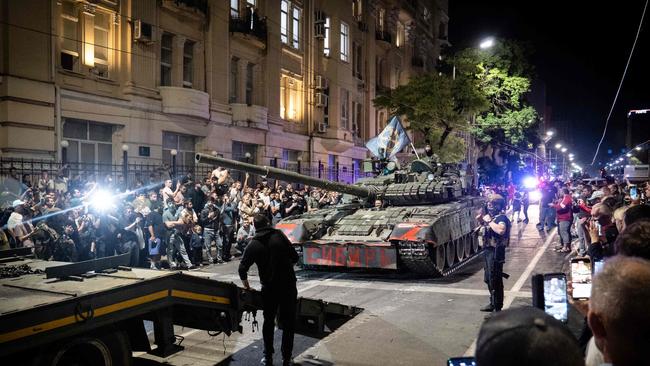
Agents from Russia’s fearsome Federal Security Service (FSB), the successor to the KGB, targeted Wagner leaders and fighters and or their families during mass raids in several Russian cities on the morning of the rebellion.
In one instance the son of a fighter was detained and others threatened if they did not sign allegiance to the Russian Federation and swear not to take the “enemy’s side”, according to independent Russia media outlets.
Families have reported several men were reportedly taken away to a pre-trial detention centre. Western intelligence agencies confirmed Russian intelligence had threatened harm before Prigozhin agreed to call off his rebellion.
Regardless, security analysts now believe the coup would have failed with Prigozhin having only 8000 mercenaries and not the 25,000 he bragged about, failed to turn regular Russian troops to his side and he had not managed to garner the political support from Russia’s elites to topple Putin.
Prigozhin launched his assault on the Kremlin after Russian attack helicopters reportedly attacked the Wagner encampment killing thousands of his troops, made up largely of battle-hardened fighters and convicts released by Putin from Russian prisons to be Wagner foot soldiers.
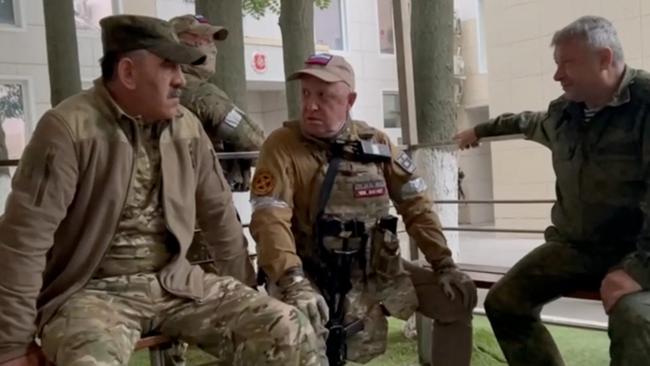
According to the Ukraine air force, Wagner struck back downing six Russian Army helicopters, two attack class and four transporters, as well as one reconnaissance intelligence Ilyushin IL-18 aircraft.
Ukraine President Volodymyr Zelensky spoke with US President Joe Biden about the internal Russian hostilities and the likelihood of a resurgence of fighting in Ukraine.
There has been much speculation that Putin’s action over the past two days might have split the Kremlin, at least privately with statements publicly declaring full support. At the very least, Russian Defence Minister Sergei Shoigu is expected to be sacked or demoted; one of the terms Prigozhin demanded as part of the deal. Like his leader, he had not been seen since Saturday and neither has head of Russian forces General Valery Gerasimov.
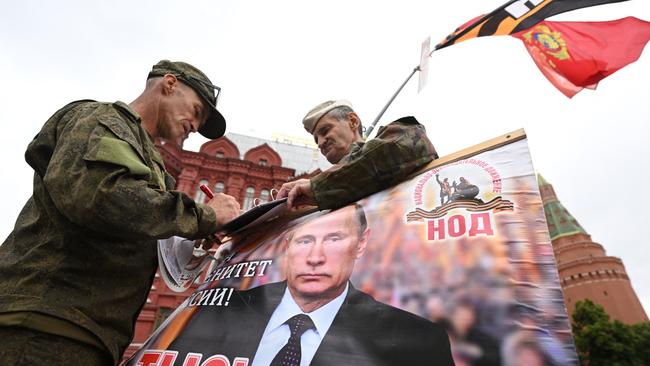
Centre for European Policy Analysis senior adviser Edward Lucas has warned Western capital to be prepared for “a deeply dangerous and unpredictable” post-Putin Russia.
“There will be all sorts of dilemmas and difficulties we face and we need to start thinking right now about how we deal with them and that’s everything from do we worry about Russia falling into the arms of China? Is there going to be disintegration? Will it go full on fascist? Will we have a long period of confusion and chaos? Will they use their nuclear weapons as a bargaining chip to try and get things?”
Former chief of the UK General Staff (British Army) Lord Richard Dannatt warned Wagner moving to Belarus was of significant concern given its proximity to Ukraine capital Kyiv.
“Although it would appear that this matter is closed I think it is far from closed and the aftershocks will reverberate for quite some time,’ he said.
With AFP
More Coverage
Originally published as ‘They will be brought to justice’: Vladimir Putin breaks silence on Wagner mutiny




